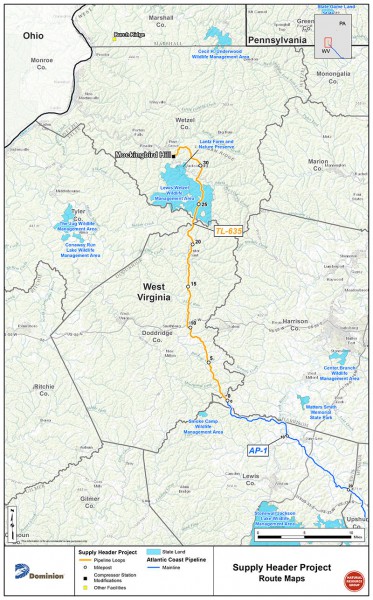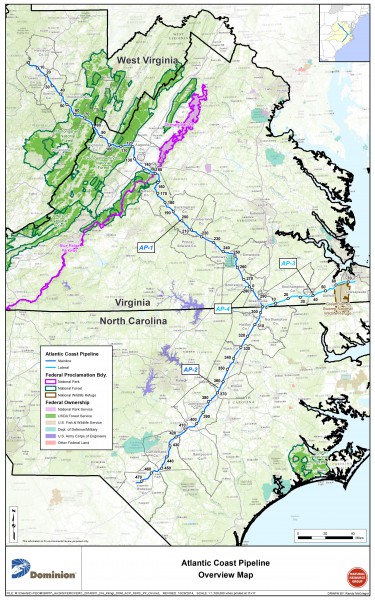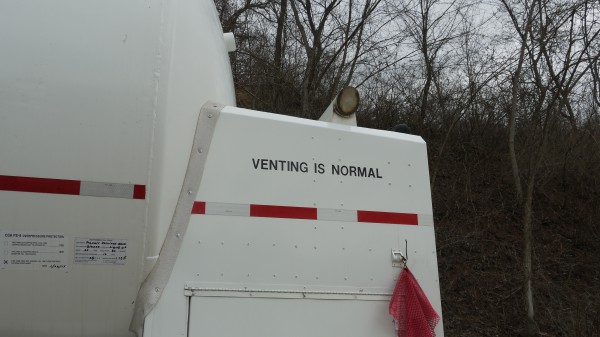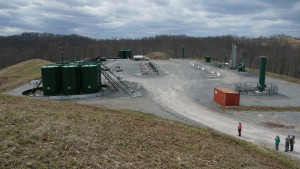Update: April Keating reports that FERC has informed her that people can make comments to FERC up until the day a pipeline is approved. So, continue piping up! FERC is especially looking for comments during the EIS period, which is the time the agency is trying to identify problems. Pipe up!
In late March, in Elkins and Bridgeport, WV, FERC held two public scoping meetings on the proposed massive Atlantic Coast Pipeline and the Supply Header Pipeline.
Doddridge County resident Christina Woods is a member of the Doddridge County Watershed Association. Christina is also an OVEC member. She was among those quoted in a West Virginia Public Radio story covering the FERC scoping meeting at the Bridgeport meeting on March 24, where she delivered these comments:
My wish for all of you is clean air, clean water and a safe place to live. Water contamination from fracking-related activities is real in Doddridge County. (Ed. note: An earlier speaker with ties to the oil and gas industry had implied that water contamination from fracking activities was not real, saying that one could find anything on the internet.)
My home is approximately one mile from the Supply Header Pipeline. The proposed Mountain Valley Pipeline runs parallel to the Supply Header Project in our area. Why would we allow two pipelines so close to one another?
At a meeting in Doddridge County, Dominion told us that the pipeline’s blast  zone radius will be 942 feet — everything 942 feet around any point of explosion along the pipeline will basically be gone/toast. (The blast radius is the distance that the fire from the explosion consumes, measured in feet from the epicenter to the outer edge of the burned area.)
zone radius will be 942 feet — everything 942 feet around any point of explosion along the pipeline will basically be gone/toast. (The blast radius is the distance that the fire from the explosion consumes, measured in feet from the epicenter to the outer edge of the burned area.)
Here is how big that is: 2,787,740 sq ft or 63.99 acres or approximately 48.5 football fields. The company should have to mark, in red, on their maps 942 feet on either side of the pipeline indicating the blast zone radius, so that the public really can see the danger of this pipeline.
Dominion told us that once an explosion happens, basically they’d just have to let it burn. How far will the fire spread? Who will control it? What toxins will we and wildlife be breathing? What effect will it have on our air and water?
According to the 2000 report from Pipeline Safety Trust, often the blast zone in explosions in the past actually has been larger than the calculated blast zone radius. So, what is the evacuation zone? How many of us will have to leave our homes for a private company’s mistakes/accidents?
Those of us living in rural areas are not expendable. We are not collateral damage.
Plain and simple, this is for private corporate profit — with risks externalized to the public. The risk is being put squarely on the shoulders of those that live around these pipelines. We are being asked to risk and pay for their risks with our air, our water, our homes, our health, our property values, our safety, possibly even our lives, along with every other living thing within our environment.
How much risk are we supposed to assume for the oil and gas industry?
We are asked to risk more and more, and all the governmental agencies look at each project like it is a vacuum — never looking at total risk and danger being put upon an area.
In Doddridge County, our homes are surrounded with well sites, condensate tanks, flowback tanks, pipelines, compressor stations, fracking chemical tanks and drilling-waste ponds. many of the chemicals used are are toxic, carcinogenic, endocrine-disrupting and/or radioactive, and could explode. It is like living in a minefield.
There already have been well fires, explosion, spills, leaks, well-water contamination and wrecks. Our roads have been destroyed by heavy truck traffic and full of drilling traffic — you take your life in your hands every time you get in your car.
We are at risk now 24 hours a day every day of the year for this industry.
Now, once again we are being asked to take on more of their risk.
We, as West Virginians, deserve better. We deserve better than to be a sacrificial zone for the profit of the extractive industries.
You have until April 28 to file written comments with FERC on this proposed pipeline. Details on filing written comments, along with suggested topics to cover, are here. More pipelines will mean more fracking activity, meaning more of this, this and this (photos taken during a recent OVEC staff tour of Lewis, Doddridge and Wetzel counties in West Virginia).
Here’s some of the news coverage on the Elkins and Bridgeport scoping meetings.
Pipeline Impact: Officials receive comments on project
FERC Hosts Second Atlantic Coast Pipeline Public Hearing in Bridgeport
Area residents speak for, against pipelines at FERC meeting
Job Creation Clashes with Environmental Risks at Pipeline Meeting
U.S. Federal Energy Regulatory Commission Heard Concerns on Atlantic Coast Pipeline Project
Natural Gas Industry Moves from the Absurd to the Profane
Atlantic Coast Pipeline Concerns Told to FERC in Harrison County, WV
FERC Challenged to Be Truly Independent
About 200 Attend Scoping Meeting in Elkins on the Atlantic Coast Pipeline
Atlantic Coast Pipeline Scoping Meeting Held in Bridgeport on March 24th













I live in Craig County, Virginia, one of the proposed alternative routes for the Mountain Valley Pipeline. I have been a life long resident and I can’t imagine living anywhere else. But, I am increasingly concerned about how the FERC views rural Americans. We feel as though you believe we are expendable, not worthy of being afforded clean drinking water, safe living conditions, viable soil. Our very health is at risk! The FERC should not be streamlining these pipelines, but doing careful and deliberate studies. Careful and deliberate studies do not happen in a few months, but take years. We constantly hear of materials or substances which are believed to be safe that in later years are found to be flawed in many ways. Take for example asbestos. This was a miracle building material, but years later you have people who are dead because of their exposure to this now known carcinogen. Must we constantly have to repeat the disasters of our industrial history. Can we not be more deliberate when people’s lives are at stake.
Appalachia has for many years been a land of forgotten people. We have learned to be self-sufficient and derive a lot of our pleasure from the simple joy of living in a natural setting. We still are a forgotten people, we are only in the spotlight for a short period of time. Just time enough for corporate American to ruin our land, devalue our property, and sicken our communities. Then I can assure you that we will be forgotten once more. I personally would prefer to remain forgotten, the least amount of governmental or corporate American involvement in my life, the better. It seems that when either are at a high level of involvement in my life my quality of life diminishes.
I am asking the FERC to please be more aware of the detrimental affects this pipeline will have on a people whose only wish is to live peacefully among nature. Please do in depth environmental and health related studies. These pipelines will be travelling through karst geological areas and steep mountain terrain. One leak could affect the drinking water for thousands of people. This pipeline placement is for no other reason than to export natural gas. If not, they would have avoided the mountains altogether. You can get to the south east much easier and at a much more cost efficient means if you do not cross the mountains. Please, please look at the human factor in this, not just the financial bottom line. We matter!
I am a resident of Nelson County, Virginia. The proposed route of the Atlantic Coast Pipeline will make a diagonal cut through our county, entering through the George Washington National Forest, the Appalachian Trail and the Blue Ridge Parkway. Nelson is one of the most flood prone areas in the state and our slopes have been designated by the USGS and the VA Dept. of Emergency Management as high risk, moderate incidence for debris flows (mudslides). This pipeline will put the lives of thousands of residents who live on, and at the base of these slopes at risk for flooding and slides once the ACP dynamites and clear cuts; the “slope crossings” will be high in number with this diagonal route. These areas also include areas already previously damaged by the aftermath of Camille in 1969 when we lost more than 100 residents to flooding and slides.
Our own Governor McAuliffe recently implied in a radio interview that Highland and Nelson counties were very “small”, as if the total number of residents is an acceptable risk. In addition, he still refuses to acknowledge the Virginia will be transmitting natural gas from frack drilling in WV.
Rural residents are being put at risk all over WV, VA, OH, and PA to support this industry and the FERC is refusing to acknowledge the risk and is in fact, colluding with these companies to force these projects at “lightning speed”.
Rural residents in both states need to voice our collective outrage to our representatives in the U.S. Congress. They should be receiving letters and calls daily until they listen!
Excellent blog..was this actually submitted to FERC? It should be…not that they will listen
The comments were delivered at a FERC scoping hearing– where they were recorded. For FERC to not pay attention to, as you note!